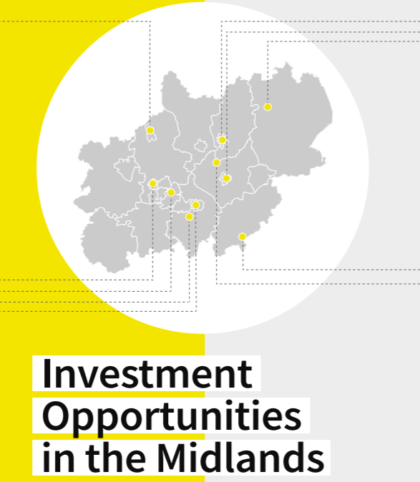
A key challenge in the university technology transfer sector, that can slow the pace of moving from an initial concept towards commercialisation, is generating fruitful connections with potential commercial collaborators and licensees.
MICRA spoke to University of Nottingham Innovation and Commercialisation Officer Toby Gould, who explained that for those involved with commercialising early stage technologies “…cold calling, outreach and pushing out technologies is inefficient in the most part”. Something which serves to make it one of the most challenging, and time consuming parts of his work, and the work being undertaken by other university technology transfer staff.
Nottingham, however, have recently had substantial success at reducing the friction that can be inherent in this part of the process thanks to their tie-up with an external partner. Sheffield based company IN-PART exist to be “an online matchmaking platform for university-industry collaboration [and provide] a bespoke scouting service for open innovation”. Toby’s team at Nottingham have been using their services and this has led to something of a step-change in how they go about making initial contacts with potential external collaborators and partners.
He explains the advantage that this gives them, and how it speeds up the process in the following terms: “Having IN-PART actively promoting a technology using the information provided to them and providing a trusted platform for interested parties to interact really magnifies our efforts to reach partners as licensing executives or commercialisation managers”.
He continues “The major advantage is being put in contact with the right person in an organisation at the right time without having them already in the black book. As is often the case, a potentially valuable partnership can be with an organisation you have little prior knowledge of, or in this case readily aligned interests. Using the IN-PART template to curate the information used to broker this kind of broadcast outreach means the key information that those scouting for technologies are looking for is there from the outset. Our IN-PART Liaison Officer, is always on hand to guide, deal with issues and make sure the platform is being used to its maximum potential.”
Toby advises that IN-PART is a useful tool in the technology transfer officer’s arsenal but not a complete “substitute for getting out there and learning about the market your technologies are going to enter as you will learn a lot from the rejections and the “no thanks, not a good fit at this time” responses. It also sometimes generates hits from potential partners that may already be -past that point in the decision making process”.
Towards the end of our conversation Toby provided an example of a recent project where the solutions offered by IN-PART proved invaluable in greasing the wheels of the technology transfer collaboration and commercialisation process.
Nottingham has entered the initial stages of a collaboration with a UK-based life sciences company to test a new technology developed by scientists at the university that could revolutionise the treatment of cancer by detecting extremely low-frequency DNA mutations in tissue samples.
Introduced through IN-PART’s matchmaking platform earlier this year, the lead scientists and Nottingham’s commercialisation team met with the firm’s research and development (R&D) staff at their UK headquarters to demonstrate the new cancer detection technology at work. A materials transfer agreement (MTA) has since been signed that will allow the R&D team to conduct in-house testing and due diligence to assess the technology’s suitability for further development and commercialisation.
Toby Gould summarised the current state of the collaboration for us in these terms:
“An non disclosure agreement (NDA) and Materials Transfer Agreement (MTA) have been signed and the R&D team are conducting their own trials of the new technology. Without the introduction via IN-PART, our technology wouldn’t have reached the right person and these discussions wouldn’t have happened.”
Described as ‘exquisitely sensitive’ by Nottingham’s researchers, the technology works by identifying low-frequency, mutant alleles from poor quality DNA samples in easily-accessible bodily fluids such as blood and urine. It’s hoped that through further development, the technology will one day assist doctors in providing improved cancer surveillance, predictive testing, treatment-monitoring and tumour genotyping for personalised cancer treatments.
The materials transfer agreement between the life sciences firm and Nottingham has formed the basis for wider discussions about knowledge exchange that could lead to long-term strategic partnership resulting in further collaboration across their shared research interests. Toby explained:
“During our visit, we discussed collaboration opportunities across the university. We have identified significant overlap in research interests and hope that this partnership will result in a larger collaboration including knowledge exchange and sharing of research funds and projects.”
From IN-PART’s perspective Communications Manager Alex Stockham says “It has been great working with Toby and the team at Nottingham. Since they joined the platform in 2017, their projects have received extremely high levels of engagement from industry. It’s really rewarding to see a breakthrough from their researchers getting picked up through our platform for further development with a company, particularly in such a crucial area as cancer detection that could have a big impact on a lot of people’s lives.
By simplifying the initial connection between academia and industry through our online matchmaking platform and our Discover service, we’re increasing the pace at which innovation developed in universities around the world can be turned into useful products, services and technologies. Not only are we looking to initiate new collaborations, the feedback R&D professionals share in response to the research we send them provides critical insights for universities to make better, more informed decisions about their technology portfolios and commercialisation strategies.”